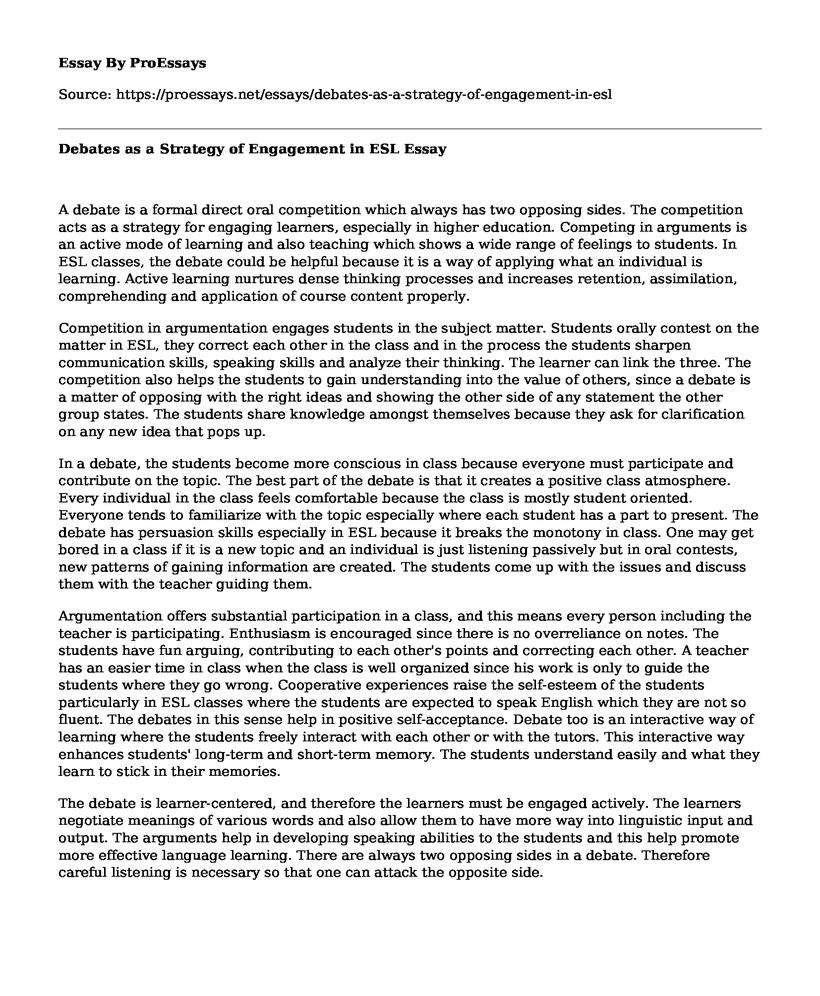A debate is a formal direct oral competition which always has two opposing sides. The competition acts as a strategy for engaging learners, especially in higher education. Competing in arguments is an active mode of learning and also teaching which shows a wide range of feelings to students. In ESL classes, the debate could be helpful because it is a way of applying what an individual is learning. Active learning nurtures dense thinking processes and increases retention, assimilation, comprehending and application of course content properly.
Competition in argumentation engages students in the subject matter. Students orally contest on the matter in ESL, they correct each other in the class and in the process the students sharpen communication skills, speaking skills and analyze their thinking. The learner can link the three. The competition also helps the students to gain understanding into the value of others, since a debate is a matter of opposing with the right ideas and showing the other side of any statement the other group states. The students share knowledge amongst themselves because they ask for clarification on any new idea that pops up.
In a debate, the students become more conscious in class because everyone must participate and contribute on the topic. The best part of the debate is that it creates a positive class atmosphere. Every individual in the class feels comfortable because the class is mostly student oriented. Everyone tends to familiarize with the topic especially where each student has a part to present. The debate has persuasion skills especially in ESL because it breaks the monotony in class. One may get bored in a class if it is a new topic and an individual is just listening passively but in oral contests, new patterns of gaining information are created. The students come up with the issues and discuss them with the teacher guiding them.
Argumentation offers substantial participation in a class, and this means every person including the teacher is participating. Enthusiasm is encouraged since there is no overreliance on notes. The students have fun arguing, contributing to each other's points and correcting each other. A teacher has an easier time in class when the class is well organized since his work is only to guide the students where they go wrong. Cooperative experiences raise the self-esteem of the students particularly in ESL classes where the students are expected to speak English which they are not so fluent. The debates in this sense help in positive self-acceptance. Debate too is an interactive way of learning where the students freely interact with each other or with the tutors. This interactive way enhances students' long-term and short-term memory. The students understand easily and what they learn to stick in their memories.
The debate is learner-centered, and therefore the learners must be engaged actively. The learners negotiate meanings of various words and also allow them to have more way into linguistic input and output. The arguments help in developing speaking abilities to the students and this help promote more effective language learning. There are always two opposing sides in a debate. Therefore careful listening is necessary so that one can attack the opposite side.
References
Zare, P. & Othman, M., 2013.Classroom debate as a systematic teaching/learning approach. World applied sciences, 28(11), pp. 1508-1513.
Kennedy, R., 2007. In-class debates: fertile ground for active learning and the cultivation of critical thinking and oral communication skills. Teaching and learning in higher education, 19(2), pp. 183-190.
Crone, J., 1997. Using panel debates to increase student involvement in the introductory sociology class. Teaching Sociology, 25(3), pp. 214-218.
Cohen, M., 1991.Making class participation a reality.Political science and politics, 24(4), pp. 699-703.
Dundes, L., 2001. Small group debates: fostering critical thinking in oral presentations with maximal class involvement. Teaching Sociology, 29(2), pp. 237-243.
Huryn, J., 1986.Debating as a teaching technique.Teaching Sociology, 14(4), pp. 266-269.
Garrett, M., Schoener, L. & Hood, L., 1986. Debate: a strategy to improve verbal communication and critical-thinking skills. Nurse Educator, 21(4), pp. 37-40.
Snider, A. & Schnurer, M., 2002. Many sides debate across the curriculum, international debate education association.
Cite this page
Debates as a Strategy of Engagement in ESL. (2022, Mar 29). Retrieved from https://proessays.net/essays/debates-as-a-strategy-of-engagement-in-esl
If you are the original author of this essay and no longer wish to have it published on the ProEssays website, please click below to request its removal:
- Conceptualization of Nursing Practice Paper
- Essay Sample on Student Organizations
- Linguistic Autobiography Essay
- Paper Example on College Students: Unequal Impact of Issues
- High School Student Behaviors: Drug Usage, Theft, and School Security - Essay Sample
- Early Childhood Education: A Critical Process for Society - Essay Sample
- 21-Year-Old College Student: Voices, Rage, and Crying - Essay Sample







